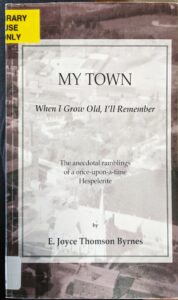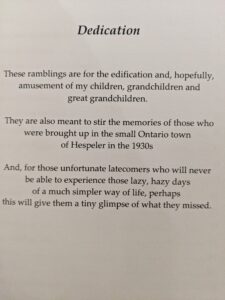The Kitchener public library has a pretty substantial collection of local history books, which are generally very rare and can’t be taken out of the library. One book there that I’ve been really taken with is “My Town”, by E. Joyce Thompson Byrnes. I have found no record of it online.

It’s an incredibly cool book, about Hespeler, Ontario as a small town in the 1930s. (It is now a neighbourhood in my current municipality.) Writing from 2013, Byrnes is playful, reflective, and extremely funny. Each chapter deals with a different facet of life at the time – commerce, medical care, holidays and festivals, and so on. This being Canada, there was in fact an entire section dedicated to hockey and ice skating.
More than anything else the comparison that springs to mind for me is Anne of Green Gables, in that it’s a very saccharine view of life in the period. But it’s also really well researched and I think does a good job of cleaving to reality. Sometimes the suck leaches in from the sides of her cheerful stories – offhand mentions of her classmates dying of smallpox, how shitty winter jackets were for keeping you warm and dry, the whole great depression thing. I kind of appreciated that. It really made me appreciate how good we have it, from the big stuff (like not having 100% of cancers be fatal) to the small (man, ice skates really sucked at the time).
There’s this line of thinking that goes – once a way of life is gone, there’s no way to really understand it. As an example, some might say that people who are working on rolling back post-9/11 surveillance laws are aspiring to a pale imitation of what we once had, and the incredible, ridiculous amount of freedom that was commonplace before then would spook the shit out of this wimp-ass generation. Or in this case, something like – we’ll never get to a truly inalienated world again and we don’t understand how much we lost to industrialization and atomization.
But this book had such vivid descriptions of life in the deliciously slow old days, and I feel like I genuinely understand a lot more now about what was lost. It seemed like a tightknit and wonderful community. Shit, is this why historians like firsthand accounts so much???

Between stories of the hilariously dark and fucked up pranks that her mom would pull, her incredibly unique vantage point into the advancement of medical science at the time, and fond recollections of ridiculously cool things that you are no longer able to do 1, what captivated me most was the descriptions of the horses.
The fucking horses, man. I cannot believe how cool they were, I had no idea how much of a tradeoff we made when we shifted to cars.
Get this. You are a milkman, because milk delivery was a commonplace thing back then. You have a horse and a cart attached to it, full of bottles of milk. You know what you were able to do? You were able to literally just chill and read a paperback between your deliveries, because your horse! Got! Your! Fucking! Route! Memorized! It will stop at the appropriate times and know what your routine is at each stop and when to get going again. I honestly had no idea that horses were smart enough to do that. So basically we literally had intelligent self driving transportation for centuries??? 2
Ok, sometimes horses threw a shitfit. There was a really funny story about the baker trying to teach his new apprentice how to do his route, but the horse really didn’t like the apprentice’s vibes. So when the apprentice tried to climb on, it protested by lying down on its side – toppling over the attached cart and sending baked goods flying into the street.
But you know, maybe we need more horse tantrums in our lives and that would make us all better people. I for one would like a greater percentage of my first world problems to be caused by something other than human coordination failures. I would pay money for more of them to be like “sorry, Applejack the horse threw a tantrum this morning and that’s why your package wasn’t delivered” instead of “the local amazon warehouse decided to cut workers and force the remaining ones to work longer shifts again”. Can the aspiring startup founders in the area start working on this please?
Anyways, this is what I got from the first third of the book. I’ve only been able to read it in fits and snatches since I can’t take it out of the library! I might start going over on my lunch breaks. Someone else should start reading it so we can start a fan club.
Final score: 10/10
- Stuff like: getting freshly squeezed warm milk from the local farm a 10 minute bike ride away as a treat (she takes the time to assure you that this was nothing to worry about despite the lack of pasteurization, as “the cows had been tested for Tuberculosis”); being able to skate all the way to Guelph on the rivers that were frozen in the wintertime; have a favourite shoe design as a kid that your cobbler was always ready to make for you in the next size up[↩]
- Byrne often jokingly questions whether or not society has progressed at all since the 30s after relegating some tale or another, but man, honestly I found myself nodding in agreement more than I expected to (so like – two times, instead of zero times).[↩]
